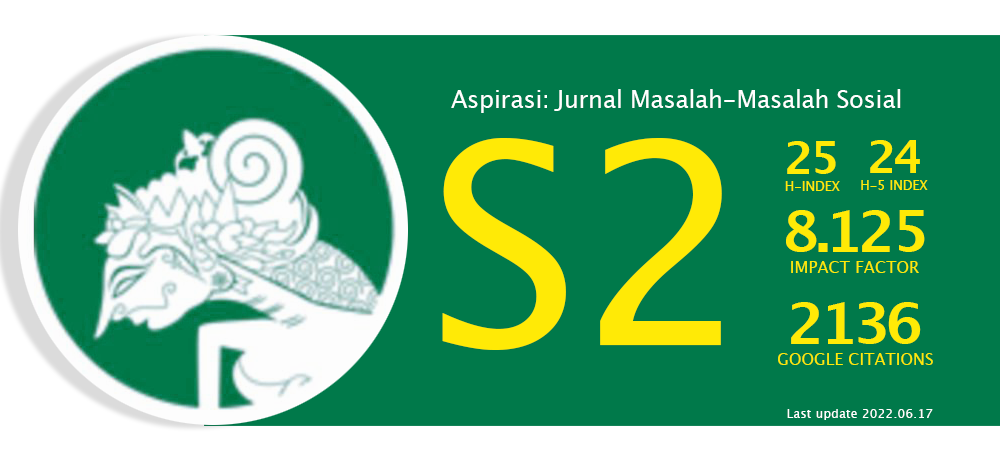Model Manajemen Pendidikan Antikorupsi Berbasis Kepemimpinan Kenabian
Abstract
This study aims to develop a corruption prevention model by optimizing the function of education. This study uses a qualitative descriptive approach with a systematic literature review methodology. The object of this research is anti-corruption behavior, with data sources from journals, textbooks, and e-books. The development of an anti-corruption education management model based on prophetic leadership behavior was carried out based on a comprehensive and transparent search through several databases and literature that were replicated and reproduced by previous researchers. The development of this model is carried out based on the aspects of transparency, clarity, integration, focus, equity, accessibility, and coverage according to research principles. The anti-corruption education management model based on prophetic leadership behavior focuses on developing anti-corruption behavior through exemplary prophetic leadership behavior in organizations. The application of this model uses 5 (five) methods with 8 (eight) stages which are carried out continuously and integrated with the management of the organization's human resources. This study also develops an anti-corruption personality assessment model based on prophetic leadership which is the development of the anti-corruption personality assessment model of the Corruption Eradication Commission, then modified with the values of prophetic leadership behavior. The anti-corruption education management model based on prophetic leadership behavior has a novelty value, namely as a systematic, comprehensive, effective, efficient, and sustainable corruption prevention innovation. This model can be used as a reference for legislator (DPR and DPRD) in carrying out preventive oversight functions on the use of state finances by the governments.
Abstrak
Penelitian ini bertujuan untuk menghasilkan sebuah model pencegahan tindak pidana korupsi melalui optimalisasi fungsi pendidikan. Penelitian ini menggunakan pendekatan deskriptif kualitatif dengan metodologi tinjauan literatur sistematik. Objek dari penelitian ini adalah perilaku antikorupsi, dengan sumber data dari jurnal, buku teks, dan buku elektronik yang relevan. Rancangan model manajemen pendidikan antikorupsi berbasis perilaku kepemimpinan kenabian ini dilakukan berdasarkan pada pencarian yang komprehensif dan transparan melalui beberapa database dan literatur yang direplikasi dan direproduksi oleh peneliti-peneliti sebelumnya. Proses penyusunan model ini juga dilakukan dengan berpedoman pada transparansi, kejelasan, integrasi, fokus, persamaan, aksesibilitas, dan cakupan yang sesuai dengan kaidah penelitian. Model manajemen pendidikan antikorupsi berbasis kepemimpinan kenabian yang dihasilkan dari penelitian ini memfokuskan pada pengembangan perilaku antikorupsi melalui keteladanan terhadap perilaku kepemimpinan kenabian di dalam organisasi. Implementasi model ini menggunakan 5 (lima) metode dengan 8 (delapan) tahapan yang dilakukan secara berkesinambungan dan terintegrasi dengan manajemen sumber daya manusia organisasi. Penelitian ini juga menghasilkan model asesmen kepribadian antikorupsi berbasis kepemimpinan kenabian, yang merupakan pengembangan dari asesmen kepribadian antikorupsi KPK, kemudian dimodifikasi dengan nilai-nilai perilaku kepemimpinan kenabian. Model manajemen pendidikan antikorupsi berbasis kepemimpinan kenabian ini memiliki nilai kebaruan (novelty), yaitu sebagai sebuah inovasi dalam upaya pencegahan tindak pidana korupsi yang sistematis, komprehensif, efektif, efisien, dan berkelanjutan. Model ini dapat menjadi rujukan bagi DPR dan DPRD dalam menjalankan fungsi pengawasan berbasis pencegahan terhadap penggunaan keuangan negara oleh pemerintah.
Keywords
Full Text:
pdfReferences
Abidin, M. Z. (2013). Psikologi profetik: Dalam kacamata filsafat ilmu studi pemikiran KH Hamdani Bakran Adz Dzakiey. IAIN Antasari Press.
Afsar, B., Badir, Y., & Kiani, U. S. (2016). Linking spiritual leadership and employee pro-environmental behavior: The influence of workplace spirituality, intrinsic motivation, and environmental passion. Journal of Environmental Psychology, 45, 79–88. doi: 10.1016/j.jenvp.2015.11.011
Agbota, T. K., Sandaker, I., de Carvalho, L. C., & Couto, K. (2017). Behavioral and cultural accounts of corruption in the interface between public officer and client. Revista Brasileira de Análise Do Comportamento, 13(1).
Antonio, M. S. (2013). Ensiklopedia prophetic leadership and management wisdom. Nuruddin M. Ali (Ed.). Jakarta: Tazkia Publishing.
Arifiyanto, D., & Budiharto, S. (2008).
Hubungan antara kepemimpinan profetik dengan kepuasan kerja. [Skripsi]. Fakultas Psikologi dan Ilmu Sosial Budaya Universitas Islam Indonesia, Yogyakarta.
Asamoah, J. K. (2017). The role of leadership in combating corruption in decentralized governance structures of Ghana: An empirical study of GA South District Assembly. Review of Public Administration and Management, 5(3), 228–236.
Bashir, M., & Hassan, S. (2020). The need for ethical leadership in combating corruption. International Review of Administrative Sciences, 86(4), 673–690.
Brueggemann, W. (2011). Prophetic leadership: Engagement in counter-imagination. Journal of Religious leadership, 10(1), 1–23.
Budiharto, S. (2015). Peran kepemimpinan profetik dalam kepemimpinan nasional. [Makalah]. Seminar Nasional The 1st National Conference on Islamic Psychology dan Inter-Islamic Conference on Psychology, Yogyakarta, 27 Februari 2015.
Budiharto, S., & Himam, F. (2006). Konstruk teoritis dan pengukuran kepemimpinan profetik. Jurnal Psikologi, 33(2), 133–145.
Butcher, J. N. (2009). Oxford handbook of personality assessment. Oxford University Press. doi: 10.1093/ oxfordhb/9780195366877.001.0001
Ceva, E., & Ferretti, M. P. (2018). Political corruption, individual behaviour and the quality of institutions. Politics, Philosophy & Economics, 17(2), 216–231.
Dames, G. E. (2014). Spiritual and ethical transformational leadership: Critical discourse analysis within a practical theology praxis. Koers: Bulletin for Christian Scholarship= Koers: Bulletin vir Christelike Wetenskap, 79(2), 1–8.
de Dieu Basabose, J. (2019). Anti-corruption education and peacebuilding: The Ubupfura project in Rwanda. Springer.
de Wet, F. W. (2014). The role of prophetic action in public theology-The implications for addressing corruption in a context of sustainable development. In die Skriflig, 48(1), 1–8.
Dewey, A., & Drahota, A. (2016). Introduction to systematic reviews: online learning module Cochrane Training. Retrieved from https://training.cochrane.org/ interactivelearning/ module-1-introduction- conductingsystematic-reviews
DiPaola, M. F., & Hoy, W. K. (2013). Principals improving instruction: Supervision, evaluation, and professional development. Charlotte: Information Age Publishing.
dos Santos, R. A. D., Guevara, A. J. D. H., Amorim, M. C. S., & Ferraz-Neto, B. H. (2012). Compliance and leadership: the susceptibility of leaders to the risk of corruption in organizations. Einstein (São Paulo), 10, 1–10.
El Syam, R. S. (2017). Prophetic leadership: The leadership model of Prophet Muhammad in political relation of social– ummah. Jurnal Pendidikan Islam, 6(2), 371–396.
Fauzan, A. N., & Budiharto, S. (2009). Hubungan antara persepsi terhadap kepemimpinan profetik atasan dan komitmen karyawan. [Skripsi]. Fakultas Psikologi dan Ilmu Sosial Budaya Universitas Islam Indonesia, Yogyakarta.
Febrianto, A. S., Noermijati, N., Juwita, H. A. J., & Alashkam, S. A. (2019). The influence of psychological empowerment and islamic spiritual leadership on organizational commitments and intrinsic motivation. Jurnal Aplikasi Manajemen, 17(3), 381–390.
Fein, E., & Weibler, J. (2014). Cognitive basis for corruption and attitudes towards corruption in organizations viewed from a structuralist adult developmental meta- perspective. Behavioral Development Bulletin, 19(3), 78–94.
Fry, L. W. (2016). Spiritual leadership. In A. Farazmand (Ed.). Global encyclopedia of public administration, public policy, and governance. p.1–6. doi: 10.1007/978-3- 319-31816-5_2353-1
Geise, L. B. (2002). Prophetic leadership: A call to action. Bloomington: Xlibris Corporation LLC.
Gill, J. K. (2002). The political price of prophetic leadership: The national council of churches and the Vietnam war. Peace & Change, 27(2), 271–300. doi: 10.1111/0149-0508.00230
Gough, D., Oliver, S., & Thomas, J. (Eds.). (2017). An introduction to systematic reviews. London: Sage Publications Ltd.
Hakim, L. (2012). Model integrasi pendidikan anti korupsi dalam kurikulum pendidikan islam. Ta’lim: Jurnal Pendidikan Agama Islam, 10(2), 141–156.
Hilert, A. J., & Tirado, C. (2019). Teaching multicultural counseling with mindfulness: A contemplative pedagogy approach. International Journal for the Advancement of Counselling, 41(4), 469–480. doi: 10.1007/s10447-018-9363-x
Integrity Watch Afghanistan. (2015). Religious leaders’ fight against corruption in Afghanistan: impact evaluation report. Kabul: Integrity Watch Afghanistan.
Kakkanattu, J. P. (2012). Old testament prophets and the call for a corruption free society. Asian Horizons, 6(01), 109–122.
Kroukamp, H. J. (2014). Effective leadership: the solution to end corruption in the South African public sector. Journal of Business and Economics, 5(8), 1413–1421.
Kumolohadi, R., & Budiharto, S. (2014). Strengthning anti-corruption carácter on leader through prophetic training and counseling. International Journal of Social and Human Behaviour Study, 1(2), 5–9.
Kuswanto, Y. A., & Budiharto, S. (2009). Hubungan antara persepsi terhadap kepemimpinan profetik dekan dengan organizational citizenship behaviour pegawai. [Skripsi]. Fakultas Psikologi dan Ilmu Sosial Budaya Universitas Islam Indonesia, Yogyakarta.
Ma, Q., & Yan, M. (2018). Psychological, behavioral, and economic perspectives on corruption. International Journal Psychology and Psychoanalysis, 4(2), 1–4. doi: 10.23937/2572-4037.1510033
Makruf, S. A. (2017). Urgensi Kepemimpinan Profetik dalam Mewujudkan Masyarakat Madani. Ta’dib: Jurnal Pendidikan Islam, 6(2), 242–254.
Mansyur, A. Y. (2013). Personal prophetic leadership sebagai model pendidikan karakter intrinsik atasi korupsi. Jurnal Pendidikan Karakter, 4(1), 15–27. doi: 10.21831/jpk.v0i1.1284
Masduki, M. (2017). Pendidikan profetik; Mengenal gagasan ilmu sosial profetik Kuntowijoyo. TOLERANSI: Media Ilmiah Komunikasi Umat Beragama, 9(1), 1–22. doi: 10.24014/trs.v9i1.4320
Mursidi, Armanu, Setiawan, M., & Aisjah, S. (2017). Prophetic, associative, activist, straight and dynamic leadership, a phenomenology study at University of Muhammadiyah Malang Indonesia. Journal of Resources Development and Management, 29, 53–57.
Nik Muhammad, N. M. (2015). Prophetic leadership model: Conceptualizing a prophet’s leadership behaviour, leader- follower mutuality and altruism to decision making quality. European Journal of Interdisciplinary Studies, 1(3), 93–106.
Nyiawung, M. D. (2010). The prophetic witness of the church as an appropriate mode of public discourse in African societies. HTS Theological Studies, 66(1), 1–8.
Park, J. J., Dizon, J. P. M., & Malcolm, M. (2020). Spiritual capital in communities of color: Religion and spirituality as sources of community cultural wealth. The Urban Review, 52(1), 127–150. doi: 10.1007/ s11256-019-00515-4
Peribadi, Tanzil, Juhaepa, & Rusli. (2019). The construction of prophetic development paradigm: a poverty and impoverishment resolution. Journal of Philosophy and Ethics 1(1):1–12.
Rahayuningsih, T. (2017). Kepemimpinan profetik, budaya organisasi, dan komitmen organisasi karyawan Universitas Abdurrab. Jurnal Psikologi, 12(2), 117–121.
Reichard, R. J. (2016). Leader developmental readiness: pursuit of leadership excellence: New directions for student leadership. San Francisco: Wiley Periodicals.
Resane, T. (2017). The church’s prophetic role in the face of corruption in the South African socio-political landscape’. Pharos Journal of Theology, 98(1), 1–13.
Rusmaini, R. (2017). Manajemen pendidikan karakter di lembaga pendidikan Islam. El- Idare: Jurnal Manajemen Pendidikan Islam, 3(1), 132–147.
Sari, E. (2019). Manajemen lingkungan pendidikan: implementasi teori manajemen pendidikan pada pengelolaan lingkungan sekolah berkelanjutan. Jawa Timur: Uwais Press.
Sendjaya, S. (2005). Morality and leadership: Examining the ethics of transformational leadership. Journal of Academic Ethics, 3(1), 75–86. doi: 10.1007/s10805-005- 0868-7
Serfontein, E., & de Waal, E. (2015). The corruption bogey in South Africa: Is public education safe? South African Journal of Education, 35(1), 1–12.
Setiadi, A., & Budiharto, S. (2008). Hubungan antara kepemimpinan profetik dengan motivasi kerja. [Prosiding Buku 10]. Seminar Nasional IV Universitas Teknologi Yogyakarta.
Setiadi, W. (2018). Korupsi di Indonesia (penyebab, bahaya, hambatan dan upaya pemberantasan, serta regulasi. Jurnal Legislasi Indonesia, 15(3), 249–262. doi: 10.54629/jli.v15i3.234
Sharma, R. R. (2010). Preventing corruption through spiritual leadership in organisations. In Organizational immunity to corruption: Building theoretical and research foundations (pp.247–260).
Sidiq, U., & Uyun, Q. (2019). Prophetic leadership in the development of religious culture in modern islamic boarding schools. Istawa: Jurnal Pendidikan Islam, 4(1), 80–97. doi: 10.24269/ijpi.v4i1.1990
Slater, J. (2016). Exploring the characteristic of prophetic-liminality in ministerial leadership: A necessary ethic for contemporary South Africa. Theologia Viatorum, 40(1), 1–24.
Stark, M., & Greggerson, K. (2016). Differences in perceptions of supervisee contribution: Supervisors’ vs. supervisees’ evaluations. The Journal of Counselor Preparation and Supervision, 8(1), 8–30.
Supriyatna. A., Kembara. M. D., Anas. Z., Tola. B., Hadiana. D., & Warsihna. J. (2017). Pendidikan antikorupsi. Modul penguatan nilai-nilai antikorupsi pada pendidikan dasar dan menengah, Jakarta: Direktorat Pendidikan dan Pelayanan Masyarakat Kedeputian Bidang Pencegahan Komisi Pemberantasan Korupsi.
Syams, A. N. (2018). Implementasi prophetic leadership di MI Nurul Ulum Bantul. Edukasia Islamika, 3(1), 105–115.
Tobroni, T. (2015). Spiritual leadership: A solution of the leadership crisis in Islamic education in Indonesia. British Journal of Education, 3(11), 40–53.
Umiarso, U. (2018). Kepemimpinan transformasional profetik dalam mengembangkan pesantren di kabupaten jember. AKADEMIKA: Jurnal Pemikiran Islam, 23(1), 87–106.
Wibowo, U. D. A. (2019). Prophetic softskills untuk bersaing di era revolusi industri 4.0. Insight: Jurnal Ilmiah Psikologi, 21(1), 30– 38.
Zuhdi, M. H. (2014). Konsep kepemimpinan dalam perspektif Islam. AKADEMIKA: Jurnal Pemikiran Islam, 19(1), 35–57.
DOI: https://doi.org/10.46807/aspirasi.v12i2.2127
Refbacks
- There are currently no refbacks.







